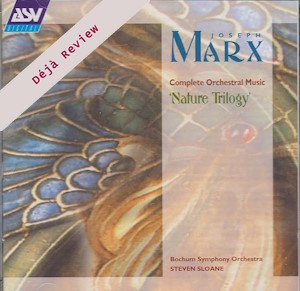
Déjà Review: this review was first published in May 2003 and the recording is still available.
Joseph Marx (1882-1964)
Natur-Trilogie
Ein Symphonische Nachtmusik (1922)
Idylle – Concertino über die pastorale Quart (1925)
Eine Frühlingsmusik (1925)
Bochum SO/Steven Sloane
rec. 2002, Maximilianpark, Hamm, Germany
Complete Orchestral Music Volume 1
Presto CD
ASV CDDCA1137 [64]
This is unambiguously the work of a nature ecstatic. If you already count Bax’s nature canvasses among your favourite works then you will be losing out if you do not get this excellent disc. The music is discursively rhapsodic, sunny, bold, soused in melody and eloquent with the voices of nature. Bax’s Spring Fire, Tintagel, Garden of Fand or Third or Fourth Symphony would be reasonable parallels but there are other tributaries flowing through Marx’s pen. These include Debussy, Delius and Korngold; not that this music is particularly dramatic. Marx has a large number of songs to his credit – some with orchestral accompaniment. His natural proclivity for lyricism is echoed into his starry and Klimt-like orchestral writing. The violins are prominent throughout – leading and luxuriating. Some may hear echoes of ripe Hollywood film music as well as Griffes’ White Peacock and Howard Hanson’s Second Symphony and early tone poems (Lux Aeterna and Nymph and Satyr) – listen to tr.2. 4.12. The harp and orchestral piano provide a glimmering counterpoint. A Daphnis-like splendour and opulence is the order of the day. This is a warm Mediterranean talent. Across the other side of Europe in the Baltic state of Latvia, Adolfs Skulte was, within five years of this piece, writing his early symphonies all of which have a similarly iridescent and saturated lyricism.
These three pieces were conceived as a coherent triptych but because of their benign complexity Marx only expected to hear the trilogy complete in his mind – rather like Havergal Brian and his Gothic Symphony. Unlike Brian, Marx never got to hear this work in a single concert. The complexity of each ‘panel’ also resulted in conductors making cuts. These have been opened out in this recording.
The scene-setting notes are by Berkant Haydin and Martin Rucker. They are invaluable. English language information about Marx is not that easily accessible outside Grove. I should correct myself in one respect. Berkant, whose generosity in introducing me to so much of Marx’s music leaves me always in his debt, has produced an outstandingly thorough, clean and very useable website on Marx. This is at www.joseph-marx.org and is well worth visiting for its information and numerous sound samples.
How I wish that ASV, Mr Sloane and the Bochum orchestra had been able to line up some sessions to record the even larger Ein Herbstsymphonie next. Instead we will have some of the lighter orchestral works. We will have to wait for the symphony and for the delightfully Respighian Castelli Romani (1929-30, for piano and orchestra) and Verklärtes Jahr (1930-32) the song cycle for voice and orchestra. Be ready to snap them up when they appear.
An impressionistic South German voice soaked in the quintessence of lyrical expression.
This is already my record of the month and will be on my list of recordings of the year. A major discovery and a harbinger of later releases which, if up to this strength, will change the shape of the catalogue for ever. My guess is that certain conductors will be looking with envious eyes at this grand score. Now how about having Ein Herbstsymphonie at the Proms in 2004?
Rob Barnett
Buying this recording via a link below generates revenue for MWI, which helps the site remain free



















